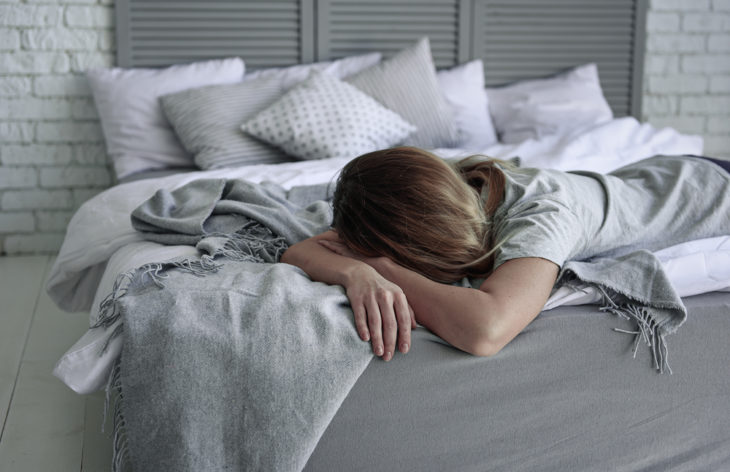When a woman who lived in my college apartment complex became overcome by her depression, took a hiatus from school, and went to stay with her parents a few hours away, I remember seething with envy. Not because she was depressed — who would be jealous of that? I was also depressed and had recently been diagnosed bipolar — but because she got to take time off.
I imagined her endless days of waking up with nowhere to be, not worried about paying rent or getting to class or work on time.
I wish I could do that, I thought. I wish I could go home.
Of course, she wasn’t on a vacation — she was simply, bravely, existing from one day to the next. Because that is what depression reduces us to. Existence as a feat.
But I wanted to be able to do that and just that. I’ve wanted that so acutely, so many times.
Sarah Silverman recently (exceedingly accurately) described depression as feeling “like I’m desperately homesick, but I’m home.”
Often in my dealing with mental illness, I’ve felt homesick not for a place, but for the ability to stay in that place, to take a beat. I’ve felt homesick for space, for time, for a break.

Source: Reader’s Digest
We hear stories all of the time about how depression chains people to their beds for days at a time, how they lose their jobs and move back in with their parents. All of that is true, and it is a ghastly thing. And while no one with mental illness is lucky — depression is a liar and being bipolar feels like a never-ending battle to at least appear normal and even-keeled and it is something I would wish on no one — the truth is that there are also a lot of mentally ill individuals who have no home to go to.
Living normally and living with mental illness often feel mutually exclusive; the things you want to do when you’re not well are the exact things you need not to do to make a living. And mental illness is nothing if not persistent. Like a predator, it is tenacious and it is pervasive. It does not care if you have any vacation days to take.
Taking time off school means losing financial aid. Taking time off work means losing jobs, missed paychecks.
Depression is technically covered under the Americans with Disabilities act, but it needs to be diagnosed, documented, and signed off on by a doctor. It requires mountains of paperwork (all of which are excruciatingly difficult to manage when you’re in the throes of depression) and even then, few people actually qualify for government assistance. And while the employers of individuals with diagnosed mental illness are required to make “reasonable accomodations” (which can be anything from letting them use sick time to permitting them to work remotely), that doesn’t mean that they comply, or that employees even know what they’re entitled to under the law.
This is what sinks people. Though American homelessness is a symptom of many systemic issues, one is the lack of support for those who just need a break; about a quarter of homeless individuals are suffering from mental illness. But homelessness is the worst-case scenario. Each day, a whole lot of mentally ill people find themselves on the brink on any given day, as they use every ounce of will they have to show up, hold down that job, and try to keep up, all the while, telling no one.

Source: Her View From Home
Because of course there is shame. But also, there’s a fruitlessness to it. No one can help. So you keep it to yourself. As long as things look fine, they are fine; you hold a white-knuckle grip on life, the way you do when you are strapped too loosely into the car of a roller-coaster and you are trying desperately to stay seated.
But there’s something to the telling.
It’s only in the last few years that I’ve begun to feel less overwhelmed, in large part because, counterintuitive as it may seem, I’ve done two things: Asked for help, and worked, constantly, to the point where I could eventually afford to have weekends and take vacations and other time off (even this is a privilege; about two-thirds of the lowest earners don’t get paid holidays or time off).
I’ve been lucky enough to be able to make a career that lets me stay home much of the time, and I’ve made space for moments throughout my days and weeks when I can collapse, when I can just not get out of bed. If you don’t hear from me on the weekends, sometimes, it’s because I am doing all of my being-depressed things during those two hallowed days.
And sometimes, I might even tell you that. Because the homesickness is lifted some when you share it.
Despite the feeling of complete isolation that mental illness creates, and the lack of social safety nets in general for those who are mentally ill, the truth is that often, there is help. Not always, but often. The only thing worse than living with mental illness is living with mental illness in secrecy.
And, like Sarah Silverman said, it does pass. If you can wait — hold your breath and bravely exist and just do that, even if you are also grinding out a living and can take no breaks — you can find home, at least temporarily.
Maybe it’s a quick cry in the bathroom at work, or a long night of staring at the ceiling instead of going to that thing you said you would attend. Maybe it’s a walk around the corner at lunch time just to feel the air. Maybe it’s asking for those reasonable accommodations that you, as a worker, are entitled to.

Source: raywilliams.ca
These things are ok, and there’s no shame in them — you are doing what you can, within the circumstances you’ve been provided. You may not always be able to go home (or stay home) when you need to, but you can find home in finding help.
Original by Hanna Brooks Olsen
